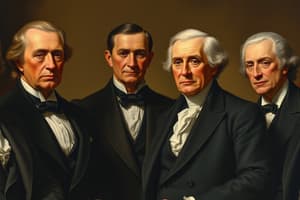Podcast
Questions and Answers
Who was the 25th President of the United States?
Who was the 25th President of the United States?
- William McKinley (correct)
- Eugene Debs
- Woodrow Wilson
- Franklin D. Roosevelt
What significant event occurred during McKinley's presidency related to Cuba?
What significant event occurred during McKinley's presidency related to Cuba?
Spanish-American War
What was Elizabeth Cady Stanton known for?
What was Elizabeth Cady Stanton known for?
- Women's Rights (correct)
- Education Reform
- Civil Rights Activism
- Labor Rights
What did Woodrow Wilson propose after his first term?
What did Woodrow Wilson propose after his first term?
What led to the sinking of the USS Maine?
What led to the sinking of the USS Maine?
What was the outcome of the US invasion of Cuba?
What was the outcome of the US invasion of Cuba?
Why did the US want to build the Panama Canal?
Why did the US want to build the Panama Canal?
What event prompted the US to enter World War I?
What event prompted the US to enter World War I?
What did the Treaty of Versailles require from Germany?
What did the Treaty of Versailles require from Germany?
What was the main mission of the League of Nations?
What was the main mission of the League of Nations?
What is militarism?
What is militarism?
What does nationalism represent?
What does nationalism represent?
How did the US manage to build the Panama Canal?
How did the US manage to build the Panama Canal?
What contributed to Woodrow Wilson's victory in the 1912 election?
What contributed to Woodrow Wilson's victory in the 1912 election?
Flashcards are hidden until you start studying
Study Notes
William McKinley
- 25th President of the United States during the Spanish-American War (1898).
- U.S. interests in Cuba led to the sinking of the U.S.S. Maine, prompting media pressure for war.
- Signed the Treaty of Paris in 1898, granting independence to Cuba and acquiring Puerto Rico, Guam, and the Philippines for $20 million.
- Viewed negatively for yielding to media influence regarding military action.
Elizabeth Cady Stanton
- Pioneer of the women's suffrage movement.
- Presented the Declaration of Sentiments at the Seneca Falls Convention, addressing broader women’s rights beyond voting.
Woodrow Wilson
- 28th President and a Democrat known for proposing the League of Nations.
- Kept the U.S. neutral during his first term of World War I.
- In 1917, sought Congress's declaration of war against Germany following attacks on U.S. ships.
Eugene Debs
- Prominent socialist and founding member of the Industrial Workers of the World.
- Ran for president as a socialist candidate.
Destruction of the USS Maine
- USS Maine, a second-class battleship, was sent to Havana in early 1898 to protect American interests.
- Sank on February 15, 1898, due to an explosion in the forward gunpowder magazines, resulting in significant loss of crew lives.
US Invasion of Cuba
- Post-sinking of the USS Maine, U.S. citizens blamed Spain, leading to McKinley’s decision to invade Cuba.
- The ship was stationed in a Cuban port, intensifying public and political pressure for military action.
Panama Canal
- Aimed to enhance global trade by connecting the Atlantic and Pacific Oceans.
- U.S. incentives helped Panama gain independence from Colombia in exchange for canal construction rights.
- Completion of the canal significantly improved shipping and trade efficiency.
Seneca Falls Conference/Women's Suffrage
- Held to discuss women's rights across social, civil, and religious dimensions.
- Organized by Elizabeth Cady Stanton, marking a pivotal moment in the women's rights movement.
US Entry into WWI
- U.S. maintained neutrality until 1917, influenced by attacks on U.S. ships and the Zimmerman telegram.
- President Wilson requested Congress declare war on Germany to support allies, particularly Great Britain.
Treaty of Versailles
- Ended World War I, imposing reparations on Germany and limiting army size.
- Redrew national boundaries, often leading to discontent among affected populations.
League of Nations
- Established post-WWI as part of the Paris Peace Conference outcomes.
- First organization dedicated to maintaining world peace, though it faced various challenges in enforcement.
Militarism
- Concept involving the support and building of a strong military, often during peacetime.
Nationalism
- Emphasizes patriotism and support for one's country, fostering national pride.
US Construction of the Panama Canal
- U.S. negotiated with Colombia for land to build the canal, but they refused to sell.
- Capitalized on rising nationalism in Panama to facilitate independence in return for canal construction rights and control.
Woodrow Wilson's Election of 1912
- Wilson emerged victorious as Republican votes were divided between Roosevelt (Progressive Party) and Taft, allowing him to secure the presidency.
Studying That Suits You
Use AI to generate personalized quizzes and flashcards to suit your learning preferences.





